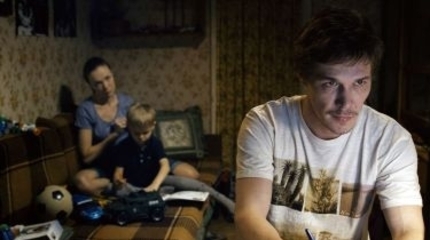Transylvania Film Festival 2015 Review: THE FOOL, A Hero's Journey to The Gutter

Yury Bykov´s tense drama The Fool - despite being anchored heavily in domestic context - addresses this universal and highly topical theme. The notion of a hero or so-called hero is approached from the bottom and in a borderline cynical way in contrast to chosen ones with capes and other fancy accessories. The protagonist, young Dima (Artyom Bystrov), struggles to make ends meet living with his wife and their little child in one tiny apartment packed also with his parents. To ensure a slightly brighter future, he studies hard while working as a plumber. Bykov foreshadows the moral dilemma to be dissected right out of bat. Dima´s mother breaks into angry outburst and rant over a seemingly peaceful family diner calling her husband a fool as he doesn't want to steal from work to help family situation while everybody else does. The fool curse descends upon Dima that very night.
The film opens with a scene of the drunken husband making a mess beating his wife and daughter senselessly until boiling water from suddenly broken pipes paradoxically cools him down. The battered wife is not going press charges because her husband has to go to work the next day in order to not lose a bonus. A simple yet highly illustrative scene from the tower of blocks inhabited by "low lives" as one of the characters defines the tenants of the severely devastated building.
Called to do routine maintenance because on the pipes of a building, Dima instead discovers a nasty looking crack in a bearing wall, a harbinger of nerve wrecking night after which never will be the same again. The future engineer checks the outside wall boasting a massive rift from foundations to the top. Having relayed the information to his supervisors Dima returns home, however, just before drifting to sleep, numbers and calculations whirl in Dima´s mind to a fairly challenging result: the tower of blocks will turn into mass grave in matter of hours.
The arising hero faces a dilemma but chooses to act on the situation in a desperate and more complicating attempt to save the lives of those pushed to the outskirts of society. Bykov orchestrates a painful nightmare for an idealistic young father uncovering a plot of heavily ingrown corruption unmasking the watchmen watching over themselves leaving those who they were supposed to watch over in grave jeopardy. Dima soon learns that such simple and urgent operation as evacuation is going to be a Sisyphean task to perform.
Similarly to Zvyagintsev´ The Leviathan, The Fool also offers an uncompromising picture of contemporary situation in Russia, however Bykov´s oeuvre rises beyond national boundaries achieving universal meaning. The outward castigation lands far from an allegory pointing toward greed, corruption and political machinations bred with mafia´s involvement in grim portrait of morally disintegrated society where having a conscious is a curse, the righteous ones are just fools and messiahs will end up in a gutter.
Bykov (writing, directing and editing) dusts off the formula of folk hero, everyman acting on higher purpose, twisting the conventions of a knight in shiny armour to amplify the caustic qualities of this acerbic drama, a subversion of a hero´s narrative. The protagonist immaculate intentions get caught up in perverse net of personal agendas and shadowy interests escalating to a gun point situation and beyond. His diligent yet still futile pursuit turns into a conundrum even though the stakes are rising higher and higher with every attempt as his only motive seems to be out of pure moral commitment.
Despite clocking in 121 minutes, the whole affair occurs on one chilly night, with Bykov upping the ante to underline the absurdity of the particular "rescue" situation as long and analytical deliberations carried out about the price of 800 innocent lives and the hero´s zeal to do the first and last thing to reverse the impending doom. The icing on the sardonic cake is the film´s anti-climactic finale delivering the shattering punch line sealing not only disillusionment but also a delusion. Bykov tries to ambitiously cut through a thick layer of indifference calling into arms against it as well as against the corrosive moral lapse in society notwhistanding the national borders without being outwardly moralising and one-sided.

Do you feel this content is inappropriate or infringes upon your rights? Click here to report it, or see our DMCA policy.






